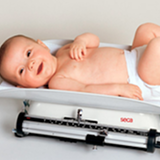Is my baby growing as he or she should?

babyadmin |
Expected length and weight
All babies are unique, and grow at their own pace. However, you may like some figures to help you gauge whether your baby is growing healthily. Generally, a baby would lose about 5 to 10 percent of its weight at birth in the first week, but this should be regained within the next two weeks. As a rule of thumb, your baby should weigh twice more than it did at birth between 4 months and 6 months of age. At the end of the first year, your baby should be thrice the weight he or she was at birth.
As for your baby's length, this varies more and should not be of as much concern as the weight. Generally, a baby should see about a 50 percent increase in length by his or her first birthday. The head circumference of an average baby is an added 7 and 8 centimetres on the first birthday compared to the measurement at birth.
For a more detailed breakdown of how your baby should be growing, you may like to consult the WHO Child Growth Standards, which can be accessed here and downloaded for easy reference: http://www.who.int/childgrowth/standards/en/.
Note that weight gain and increases in length are not systematic. This is especially because your baby is very likely to go through about five growth spurts in the first year alone. Sometimes, the growth spurt can be so dramatic that a piece of clothing that fit a couple of days ago no longer fit! It is thus best to measure both at perhaps intervals of 3 weeks to a month, instead of measuring it every week and feeling more alarmed that you should at varying changes.
Keeping track of your baby's growth
In keeping track of your baby's growth, you can purchase or rent baby measurement equipment for use at home. To weigh your baby, you could use the Seca weighing scale mat. For measuring your baby's length and head circumference, you could use the Seca measuring mat or the Seca baby head circumference measuring tape. Seca measuring equipment are made with skin-friendly material that ensures the comfort of your baby.
For more accurate weighing, try to use the same scale throughout your baby's first year for consistent measuring. You should also try to weigh your baby without clothes on so that the varying weight of your baby's clothes does not affect the reading. Try to weigh your baby at the same time of the day as well; weighing your baby just prior to or after a feed can make a significant difference in the reading. The same goes for weighing your baby just before or just afer a bowel movement!
When you go for regular check-ups at the doctor's, your baby will also be weighed and measured. During these check-ups, your doctor will also advise you if he or she thinks that your baby is not growing at a good rate. If you have any concerns as well, do bring these up during these consultations so that you know what to do, and your mind can be put at ease.
